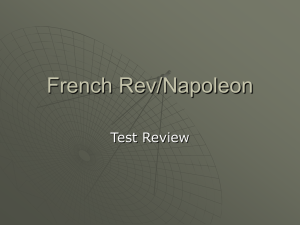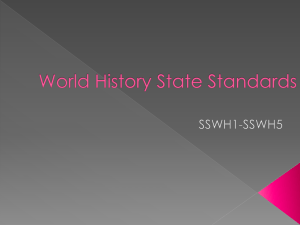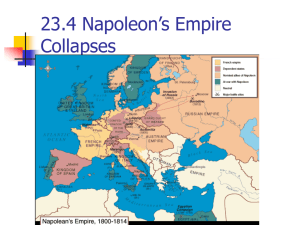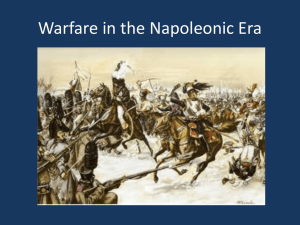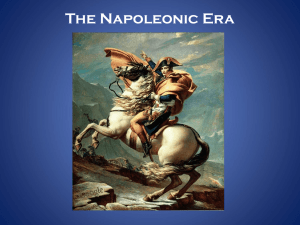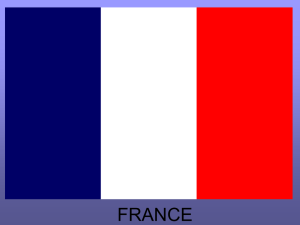French Revolution PPT 3
advertisement
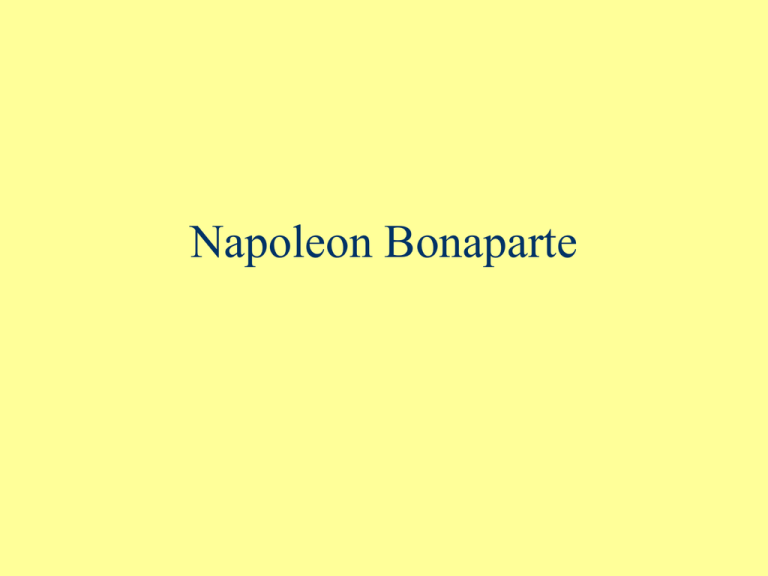
Napoleon Bonaparte Early Life • Born on the Mediterranean island of Corsica in 1769 • His parents sent him to military school • When the Revolution broke out, Napoleon joined the army of the new government Hero of the Hour • Napoleon defended the delegates of the National Convention from attackers, and he instantly became a hero • Won a string of victories in Europe • He was finally defeated in Egypt by the British admiral Horatio Nelson – Napoleon kept this setback out of the newspapers, so he was still considered a hero Coup d’Etat • Napoleon and his troops surrounded the national legislature and drove out most of its members • Coup d’Etat- Military overthrow of the government • The Directory dissolved and lost its power – Napoleon gave himself the title of First Consul and assumed the power of a dictator Peace • Britain, Austria, and Russia signed peace treaties with France • By 1802, Europe was at peace for the first time in 10 years • Napoleon could now focus his energies on restoring order in France Plebiscite • Definition- vote of the people • Voted to approve a new constitution • The new constitution gave all real power to Napoleon as first consul Restoring Order in France • Napoleon kept many of the changes that had come with the Revolution • He kept laws that would both strengthen the central government and achieve some of the goals of the Revolution • Areas which were affected: – Economy – Government – Religion Economy • Set up an efficient method of collecting taxes • Established a national banking system • Promoted sound financial management and better control of the economy Government • Dismissed corrupt officials • Lycees- Government-run public schools – Open to male students of all backgrounds – Graduates were appointed to public office on the basis of merit rather than family connection Religion • One area where Napoleon disregarded changes introduced by the Revolution – Wanted to restore the position of the Church in France Religion, cont. • Concordat- agreement with the Pope that established a new relationship between church and state – Government recognized the influence of the Church, but rejected Church control in national affairs – Napoleon gained support of the majority of the French people Napoleonic Code • Comprehensive system of laws • Napoleon viewed this as his greatest accomplishment • Eliminated many injustices, but actually limited liberty and promoted order and authority over individual rights • Restored slavery in the French colonies in the Caribbean Emperor • Napoleon decided to make himself emperor • Actually took the crown out of the Pope’s hands and placed it on his own head • With this gesture, he signaled that he was more powerful than the Church Creating an Empire • Wanted to control all of Europe and reassert French power in the Americas – Envisioned his western empire including Louisiana, Florida, French Guiana, and the French West Indies – Saint Domingue was the key to conquering the rest Saint Domingue • People on the island demanded the same rights awarded to the French from the revolution • Toussant L’Ouverture- leader of the enslaved Africans who seized control of the island Louisiana Territory • Napoleon sold all of this land to the U.S. • President Jefferson purchased this for $15 million • Napoleon’s twofold benefit: – Gained money to finance operations in Europe – He would punish the British Conquering Europe • Already owned the Austrian Netherlands and parts of Italy and Switzerland, but Napoleon wanted to conquer the rest of Europe – British joined forces with Russia, Austria, and Sweden to stop him – Napoleon crushed the opposition • Austria, Prussia, and Russia signed peace treaties • He had built the largest European empire since that of the Romans Battle of Trafalgar • Napoleon’s only major loss • Took place off the coast of Spain • Led by the British commander Horatio Nelson – Split the French fleet and captured many ships Battle of Trafalgar, cont. • French loss had two major results: – Ensured the supremacy of the British navy for the next 100 years – Forced Napoleon to give up his plans of invading Britain Napoleon’s French Empire • By 1812, the only areas of Europe free from Napoleon’s control were Britain, Portugal, Sweden, and the Ottoman Empire • Russia, Prussia, and Austria were also easily manipulated by threats of military action • (See map on page 232) Napoleon’s French Empire, cont. • Huge but unstable • Could only maintain it for 5 years (18071812 • Quickly fell to pieces due to Napoleon’s actions Napoleon’s Costly Mistakes • The Continental System • The Peninsular War • The Invasion of Russia The Continental System • Napoleon set up a blockade to prevent all trade & communication between Great Britain and other European nations – Was supposed to make continental Europe more self-sufficient – Intended it to destroy Great Britain’s commercial and industrial economy The Continental System, cont. • Blockade wasn’t tight enough • Stronger British Navy rerouted all ships to their own ports to be searched and taxed – Angered Americans and the U.S. declared war on Britain in 1812 (War of 1812) The Peninsular War • Napoleon invaded Spain The Peninsular War, cont. • He removed the Spanish king and replaced him with his brother Joseph--this outraged the Spanish people • They also worried that Napoleon would attack the Catholic Church (Spaniards were devout Catholics) The Peninsular War, cont. • Guerrillas- bands of Spanish fighters who ambushed French troops within the country • British sent troops to aid the Spanish against the French • Napoleon lost about 300,000 men during this war, weakening the French Empire Nationalism • Nationalism- loyalty to one’s own country • This was becoming a powerful weapon against Napoleon because people were beginning to feel abused by him • Several countries started turning against the French The Invasion of Russia (see page 236) • Napoleon’s biggest mistake • Breakdown of the alliance between France and Russia – Alexander I refused to stop selling grain to Britain – France and Russia were both competing for Poland The Invasion of Russia, cont. • June 1812- Napoleon’s 420,000 troops invaded Russia • Scorched-earth policy- As Russian troops were retreating, they burned grain fields and slaughtered livestock as to leave nothing for the enemy to eat The Invasion of Russia, cont. • Moscow- considered Russia’s “holy city” • When Napoleon entered the city, it was in flames – Alexander destroyed it so they didn’t have to surrender it to Napoleon The Invasion of Russia, cont. • Russian winters were very harsh, and Napoleon’s troops were starting to drop from battle, hunger, exhaustion, and cold • Napoleon’s troops retreated from Moscow and left Russia with only 10,000 soldiers Napoleon’s Downfall • Knowing Napoleon’s army was weak, all of the main powers in Europe declared war on France (Britain, Russia, Prussia, Sweden, and Austria) • Napoleon raised another army, but it was very weak Battle of Leipzig • October 1813 • Allied forces were easily able to defeat Napoleon’s untrained and inexperienced army Napoleon’s Exile • In April 1814, Napoleon accepted the terms of surrender and gave up his throne • Allied leaders exiled him to Elba, a tiny island off the Italian coast Louis XVIII • Brother of Louis XVI • Became the new king of France and quickly became very unpopular with the French people Napoleon’s Escape • When Napoleon heard of Louis XVIII’s troubles, he escaped from Elba • He returned to France and regained power as emperor within a few days Battle of Waterloo • British troops prepared for battle against Napoleon in Waterloo, Belgium • June 18, 1815- Napoleon attacked • British and Prussian forces defeated Napoleon in two days Hundred Days • Napoleon’s last bid for power • British exiled Napoleon to St. Helena, a remote island in the South Atlantic • He lived there for 6 years before he died of an illness “He was as great a man can be without virtue.” -Alexis de Tocqueville




